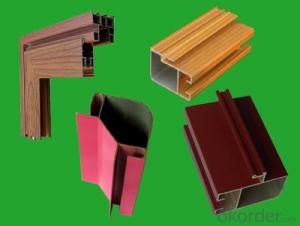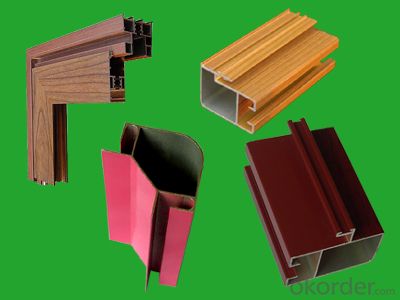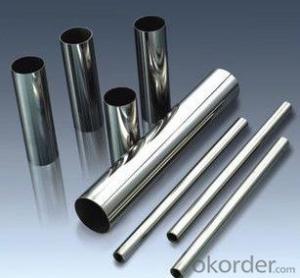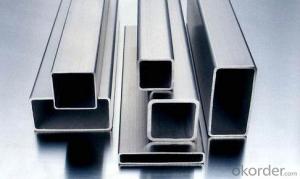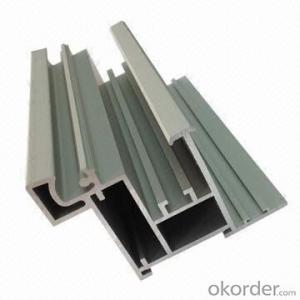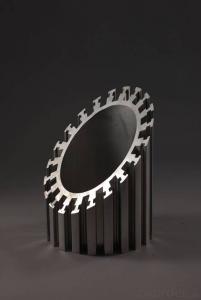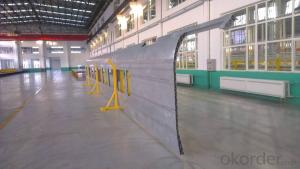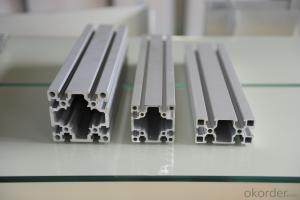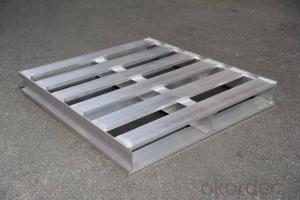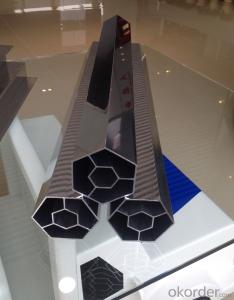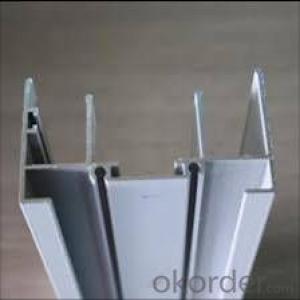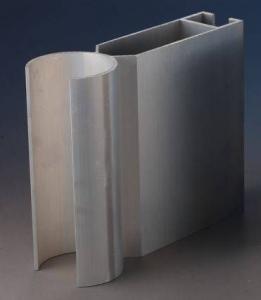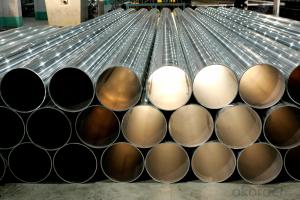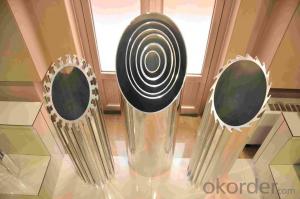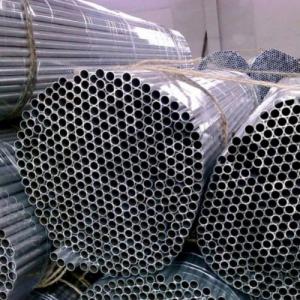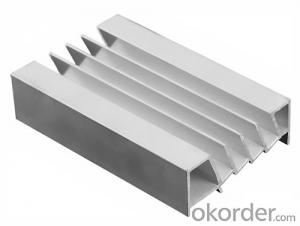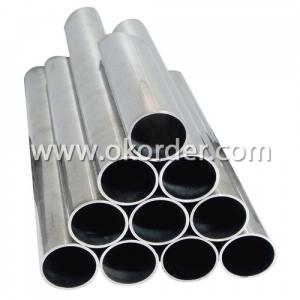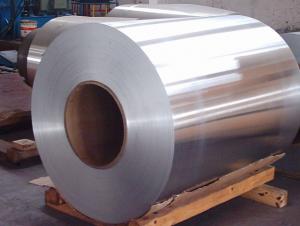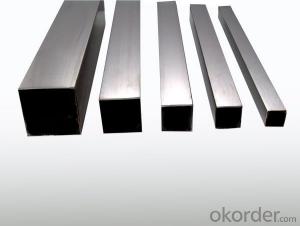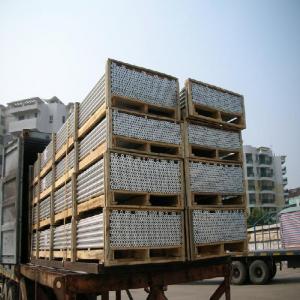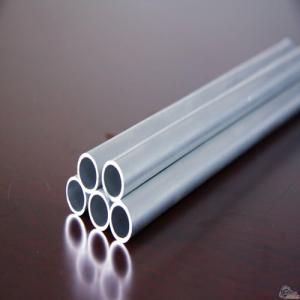Aluminum Window Door Pipes
OKorder Service Pledge
OKorder Financial Service
You Might Also Like
We are the largest aluminum profilemanufacture in
Material | Alloy Aluminum 6063,6061,6005,6082 or customer nominated |
Temper | T3, T4, T5, T6 and other |
Surface | Anodize, electrophoresis, powder coating, PVDF coating, wood grain painting, etc. |
Colour | Any colour based on Standard Germany RAL Mark |
Length | Not more than 16 meters |
Good Package | Inner plastic film /outside carton/wooden pallets |
Payment Method | T/T, L/C, etc |
Delivery Time | Normally 2-4 weeks, Delivery time can be consulted. |
Press Machine | 500-12500 tons all together 93 press lines. |
Fabrication | 1. Furniture;2. Drilling; 3. Bending; 4. Cutting; 5. Windows and doors;6.etc. |
Certificate | ISO/TS 16949,DNV,IRIS,CCS,AFA,etc. |
Dies | 1. Using our dies, no fee; |
2. Using customer drawing, opening dies, usually about 5~50 tons then the dies cost can be refunded. | |
3. Die cost is negotiable base on the order quantity | |
Capability | Annual output 800,000 tons |
- Q: Are aluminum pipes suitable for underground drainage systems?
- Yes, aluminum pipes are suitable for underground drainage systems. They are lightweight, durable, and resistant to corrosion, making them a reliable choice for long-term use in underground environments. Additionally, aluminum pipes offer easy installation and maintenance, making them a practical option for underground drainage systems.
- Q: Can aluminum pipes be used for high-pressure applications?
- Indeed, high-pressure applications can utilize aluminum pipes. Being a lightweight, durable, and corrosion-resistant material, aluminum proves itself as a fitting option for a wide range of industries and applications, including high-pressure systems. Nonetheless, the precise pressure capacity of an aluminum pipe relies on factors such as size, wall thickness, and alloy composition. To guarantee the appropriateness of the selected aluminum pipe for the desired high-pressure application, it is crucial to refer to industry standards, guidelines, and consult engineering professionals.
- Q: How do aluminum pipes handle vibration and shock loads?
- The remarkable ability of aluminum pipes to handle vibration and shock loads is widely recognized. This can be attributed mainly to their inherent characteristics and properties. Being a lightweight and highly ductile metal, aluminum possesses the unique capability to deform under stress without fracturing. This flexibility allows aluminum pipes to effectively absorb and dissipate vibrations and shocks, preventing their transmission to other components of the system. Furthermore, aluminum boasts a high strength-to-weight ratio, endowing it with great durability and resilience. Consequently, aluminum pipes can withstand significant impact forces and sudden shocks without deforming or failing. This exceptional strength makes aluminum pipes an ideal choice for applications in industries such as automotive and aerospace, where vibration and shock loads are anticipated. Notably, aluminum exhibits excellent resistance to corrosion, rendering it suitable for usage in diverse environments. Corrosion can weaken pipes, making them more susceptible to failure under vibration and shock loads. However, the corrosion resistance properties of aluminum ensure the structural integrity of the pipes remains intact over extended periods, enabling them to withstand such loads. In summary, aluminum pipes possess the necessary attributes to handle vibration and shock loads effectively. Their lightweight nature, ductility, high strength-to-weight ratio, and corrosion resistance make them a dependable choice for applications where these loads are a concern. As a result, aluminum pipes offer durability and longevity to the systems in which they are employed.
- Q: What is the difference between water conditioned copper tubes and aluminum tubes?
- From the price point of view, the aluminum tube is much cheaper than copper; from the heat transfer effect, the copper tube is better than the aluminum tube; from the quality, the copper tube is more durable than the aluminum tube, and the service life is long. In a word, copper tubes are better than aluminium tubes
- Q: Aluminum tube processing process prone to deformation, how to solve?
- Analysis of what is caused by deformation, if it is because the aluminum tube in stress, can be resolved by vibration aging treatment
- Q: Are aluminum pipes suitable for food packaging systems?
- Yes, aluminum pipes are suitable for food packaging systems. Aluminum pipes are widely used in the food industry for packaging various food products due to their excellent properties. Firstly, aluminum is a lightweight material, which makes it highly convenient for packaging applications. It allows for easy transportation and handling of food products, reducing the overall shipping costs. Additionally, aluminum pipes are strong and durable, providing protection to the packaged food during storage and transportation. Moreover, aluminum is a non-toxic and non-reactive material, which makes it safe for food packaging. It does not release any harmful substances that could contaminate the food, ensuring the integrity and quality of the packaged products. Aluminum pipes also have excellent barrier properties, protecting the food from moisture, light, and oxygen, which can cause spoilage and degradation. Furthermore, aluminum is a highly recyclable material, making it an environmentally friendly choice for food packaging systems. It can be easily recycled and reused without losing its properties, reducing the environmental impact of packaging waste. Overall, aluminum pipes are a suitable choice for food packaging systems due to their lightweight, strength, non-toxicity, barrier properties, and recyclability. They provide an effective and safe packaging solution for various food products, ensuring their freshness, quality, and longevity.
- Q: Are aluminum pipes suitable for pulp and paper processing?
- Pulp and paper processing can benefit from the use of aluminum pipes. Aluminum possesses versatility and durability, making it a suitable material for this particular application. To begin with, aluminum pipes are lightweight, making them easier to handle and install compared to alternative materials. This characteristic can aid in reducing labor and transportation costs during the construction or maintenance of pulp and paper processing facilities. Furthermore, aluminum pipes exhibit exceptional resistance to corrosion. The pulp and paper industry involves the use of corrosive substances and chemicals in the processing of pulp and the production of paper. Aluminum's inherent resistance to corrosion makes it an appropriate option for transporting these substances without the risk of pipe degradation or contamination. Moreover, aluminum pipes possess high heat conductivity, which can prove advantageous in specific stages of pulp and paper processing that require temperature control. This heat conductivity allows for efficient heat transfer, leading to enhanced energy efficiency and cost savings. Additionally, aluminum is a recyclable material, aligning with the industry's growing emphasis on sustainability and environmental responsibility. By recycling aluminum pipes, greenhouse gas emissions can be reduced, and natural resources can be conserved. Nevertheless, it is vital to consider the specific requirements of each application within the pulp and paper processing industry before settling on a material choice. Some processes or environments may necessitate different materials based on factors such as pressure, temperature, or chemical compatibility. Seeking guidance from industry experts or engineers can aid in determining the most suitable material for a particular application.
- Q: Are aluminum pipes suitable for pharmaceutical manufacturing?
- Yes, aluminum pipes are suitable for pharmaceutical manufacturing. Aluminum is a versatile material that offers excellent corrosion resistance, durability, and cleanliness, making it ideal for pharmaceutical applications. Additionally, aluminum pipes can be easily cleaned and sanitized, ensuring the integrity and safety of pharmaceutical products.
- Q: Are aluminum pipes suitable for structural supports in buildings?
- Under certain circumstances, aluminum pipes can serve as appropriate structural supports in buildings. With its lightweight nature, aluminum becomes an appealing choice for construction projects that prioritize easy handling and installation. In addition, aluminum pipes possess corrosion resistance, which proves beneficial in environments with high humidity or exposure to chemicals. However, it is crucial to take into account the load-bearing requirements of the building when opting for aluminum pipes as structural supports. Compared to materials like steel, aluminum has a lower strength-to-weight ratio, indicating its unsuitability for heavy loads or applications demanding substantial structural support. In such instances, it would be more appropriate to select steel or other stronger materials. Moreover, under heavy loads or extreme weather conditions, aluminum pipes may be prone to deformation or bending. Failure to adequately address these concerns during the design and construction process can compromise the structural integrity of the building. Ultimately, the decision to utilize aluminum pipes as structural supports in buildings should rely on a comprehensive analysis of project-specific requirements, load-bearing considerations, and consultation with structural engineers or field experts.
- Q: Are aluminum pipes suitable for chemical processing plants?
- Yes, aluminum pipes are suitable for certain applications in chemical processing plants. They are lightweight, corrosion-resistant, and have good thermal conductivity. However, aluminum may not be suitable for all chemical processes as it can react with certain chemicals and may not have the same strength as other materials in high-pressure or high-temperature applications. Therefore, it is important to consider the specific requirements of the chemical processing plant before determining the suitability of aluminum pipes.
Send your message to us
Aluminum Window Door Pipes
OKorder Service Pledge
OKorder Financial Service
Similar products
Hot products
Hot Searches
Related keywords
